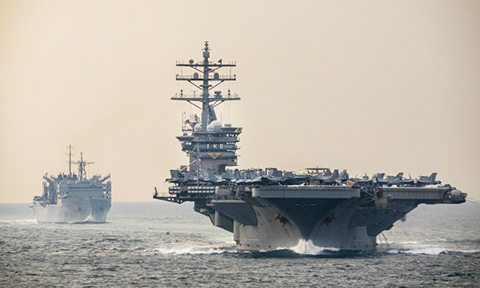Frustrated by the continuous attacks on cargo ships passing through the Red Sea, the US and related countries have attacked Houthi forces in Yemen.
US aircraft carrier. Photo: US NAVY
According to the US military, as of mid-January, the Houthis have launched 27 attacks on ships passing through the Red Sea, affecting more than 50 countries. Most recently, the US Central Command confirmed that the Houthis in Yemen attacked the US container ship M/V Gibraltar Eagle with an anti-ship ballistic missile. However, there were no reports of casualties or significant damage. The Houthis have not commented on the incident. The owner of the attacked ship - the US-based Eagle Bulk Shipping company - has not immediately responded to this information.
Meanwhile, the United Kingdom Maritime Trade Operations (UKMTO), operated by the British Navy, also announced on January 15 that a ship was hit by a missile from above just 95 nautical miles southeast of the city of Aden, but did not disclose the name of the ship.
The Houthis, in addition to pledging solidarity with the Palestinian Islamic Hamas Movement, have also announced that they will target merchant ships passing through the Gulf of Aden until Israel stops fighting Hamas. A senior Houthi commander announced that the force is conducting attacks on US and British vessels in the Red Sea in response to the airstrikes in Yemen.
With these moves, the US and UK have carried out attacks on dozens of Houthi-related targets in Yemen in the past few days. US National Security Council spokesman John Kirby said that Washington only wanted to prevent Houthi gunmen from attacking cargo ships in the Red Sea. Mr. Kirby emphasized that the US did not want its activities in the Red Sea to turn into a conflict with Yemen.
Asked about the progress of the campaign, Mr. Kirby said that the US airstrikes were aimed at “weakening” the Houthis’ ability to carry out other attacks.
The Netherlands, Australia, Canada and Bahrain provided logistical and intelligence support for the operation, US officials said. Germany, Denmark, New Zealand and South Korea signed a joint statement with the six countries justifying the airstrikes and warning of further action to protect trade through the Red Sea if the Houthis do not back down.
However, the New York Times on January 13 said that the US and UK military operations did not cause major damage to the Houthis. According to the newspaper, only about 25% of the Houthis' assets were destroyed.
The US and UK offensive against the Houthis has also drawn mixed reactions. Russia has called the US and UK operations “illegal” due to the lack of UN Security Council authorization. Meanwhile, Turkish President Recep Tayyip Erdogan has accused the US and UK of trying to turn the Red Sea into a “sea of blood.”
In a related move, Mr. Kirby admitted that Washington could not rule out the possibility of seeing the Houthis carry out a retaliatory attack and was “monitoring the situation very closely.” He said that some “necessary precautions” had also been taken, but did not disclose details.
From protecting cargo ships passing through the Red Sea from attacks, the scenario of a preemptive attack on the Houthi forces in Yemen by the US, UK and some Western countries has ignited a new conflict. This will be a fierce and deadly war and it is difficult to find a peaceful solution. This means that a new war has begun in Yemen. It will make this Middle Eastern country, which is already poor because of war and disease, even more miserable.
The US military has just announced the destruction of four anti-ship missiles that the Houthis were preparing to launch from a location in Yemen against ships in the Red Sea. These missiles were about to be launched from Houthi-controlled positions in Yemen, creating an imminent threat to US merchant and naval vessels in the region. |
HN synthesis
Source



























































































Comment (0)